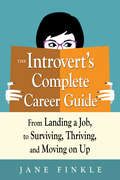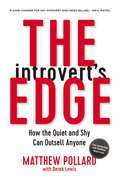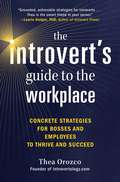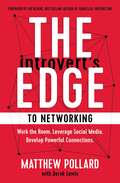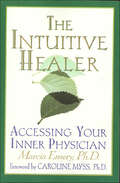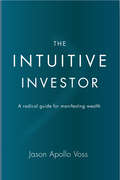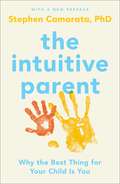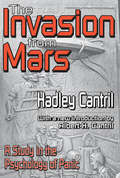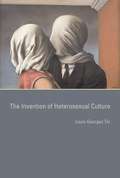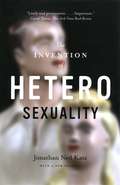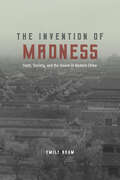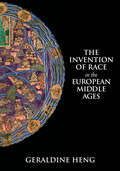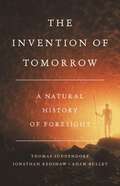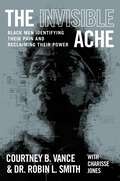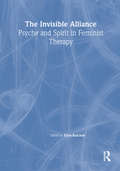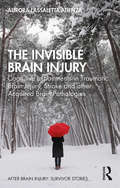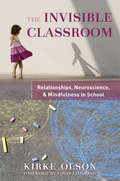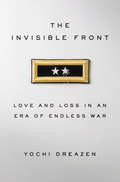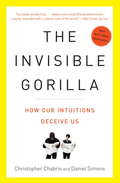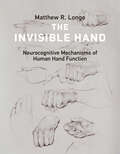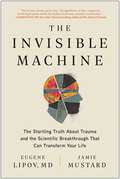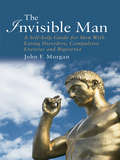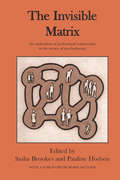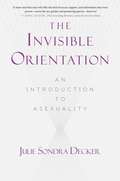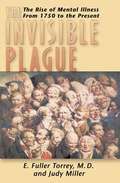- Table View
- List View
The Introvert's Complete Career Guide: From Landing a Job, to Surviving, Thriving, and Moving On Up
by Jane FinkleWhat do Elon Musk, Warren Buffet, Marissa Mayer, and Bill Gates all have in common outside of being wildly successful? They are all introverts. <P><P>In today's fast-paced, unstable workplace achieving success requires speaking up, promoting oneself and one's ideas, and taking initiative. Extroverts, fearless in tooting their own horns, naturally thrive in this environment, but introverts often stumble. If you question your ability to perform and succeed in this extroverted work culture, The Introvert's Complete Career Guide is custom fit for you.In this supportive, all-inclusive handbook, Jane Finkle demonstrates how to use your introverted qualities to their best advantage, then add a sprinkling of extroverted skills to round out a forceful combination for ultimate career success. Finkle shares the keys to navigating each stage of professional development--from self-assessment and job searching, to survival in a new position and career advancement. <P><P>In The Introvert's Complete Career Guide you will learn to:Build confidence by evaluating your values, personality style, interests, and achievements <P><P>Write the story of your career in resume and LinkedIn formats <P><P>Use social media at your own comfort level to promote your career and expand your network <P><P>Express yourself clearly and confidently in network meetings, interviews, and workplace situations <P><P>Build strong professional relationships with colleagues and senior leaders <P><P>Overcome fears that prevent you from embracing new challenges <P><P>Equally applicable to the real or virtual workplace, The Introvert's Complete Career Guide provides strategies, tools, and success stories that win you the professional respect and recognition you deserve.
The Introvert's Edge: How the Quiet and Shy Can Outsell Anyone
by Derek Lewis Matthew PollardAn introvert? Great at sales? YES.Sales is a skill anyone can learn and master — and introverts are especially good at it once they learn how to leverage their natural strengths.Introverts aren’t comfortable with traditional tactics like aggressively pushing a product or talking over a customer’s objections. That’s the beauty of The Introvert’s Edge: it doesn’t focus on the sale itself but on a sales system that helps introverts feel sincere instead of sales-y. Powerful and practical, the book reveals how to:Find natural confidencePrepare for every situationPresent your value so that customers want to buySidestep objectionsJudge when the customer’s ready to buyAsk for the sale — without askingContinually adapt and improveProfit from a process that doesn’t rely on personalityEnjoy salesWith stories of introverted entrepreneurs, salespeople, and business owners who went from stagnant to success, The Introvert’s Edge shows you how to succeed in sales — without changing who you are.
The Introvert's Guide to the Workplace: Concrete Strategies for Bosses and Employees to Thrive and Succeed
by Thea OrozcoTap Into Your Natural Introvert Strengths in the Office with Actionable Tips and Advice Introverts make up one half of the population, and we&’re hardwired to thrive—especially in the workplace! However, it&’s not uncommon for introverts to feel out of place in the office, where it seems the only ones succeeding are outgoing personalities ready to toot their own horn. Thea Orozco busts that myth, showing how the workplace is truly a setting for introverts to succeed based on their innate skillset and natural introvert strengths. With topics ranging from overcoming phone phobia to developing an authentic leadership style, The Introvert's Guide to the Workplace guides introverts through thriving at work without having to shout—whether you are a boss, an employee, or a career person. Learn from actionable tips and practical advice, and surmount office challenges and let your introversion take the lead: Combat interview anxietyMake meaningful connections at networking eventsBe heard and noticed at meetings or on the stageOvercome imposter syndromeBecome an effective leader with your introvert strengthsAnd more! Including diverse expert interviews, The Introvert's Guide to the Workplace is every working introvert&’s handbook and guide that they can refer to throughout their career for guidance on tricky or draining situations and motivation to enlist the power of their inner introvert to succeed.
The Introvert’s Edge to Networking: Work the Room. Leverage Social Media. Develop Powerful Connections (The Introvert’s Edge Series)
by Matthew PollardOne of the biggest myths that plagues the business world today is that our ability to network depends on having the &“gift-of-gab.&” You don&’t have to be outgoing to be successful at networking. You don&’t have to become a relentless self-promoter. In fact, you don&’t have to act like an extrovert at all.The truth is that when introverts are armed with a plan that lets them be their authentic selves, they make the best networkers.Matthew Pollard, an introvert himself, draws on over a decade of research and real-world examples to provide an actionable blueprint for introverted networking. A sequel to Pollard&’s international bestseller The Introvert&’s Edge: How the Quiet and Shy Can Outsell Anyone, this book masterfully confronts the stigma around the so-called extroverted arena of networking.In The Introvert&’s Edge to Networking, you&’ll discover how to:Overcome your fear and discomfort when networkingTurn networking into a repeatable systemLeverage your innate introverted strengthsTarget and connect with top influencersLeverage the power of virtual and social networkingThe introvert&’s roadmap to success doesn&’t look like the extroverts, we&’re different and we should embrace that.Whether you&’re a small business owner struggling to make a living or a professional who&’s hit a career plateau, The Introvert&’s Edge to Networking is your path to a higher income and a rolodex of powerful connections.
The Intuitive Healer: Accessing Your Inner Physician
by Marcia EmeryThe doctor is within.Do you believe that you are doing everything you can to help yourself heal? Do you listen to your body, heeding its messages on health-- or disease? So you honor your hunches when something just doesn't feel right? Would you like to learn how?In The Intuitive Healer, renowned intuition expert, Dr. Marcia Emery shows readers how to unlock their inner powers of health and healing by harnessing the wisdom of their intuition. Learn how to:* Discover the deeper meaning of any ailment* Know what steps to take to address the causes of disease and begin the process of healing* "Tune in" to any ailing body part to help healing take place* Hear the intuitive healer speak through dreamsThrough inspirational anecdotes and step-by-step exercises, Dr. Emery will show you how to call on your own "inner physician" for a dose of prevention or a cure for what ails you. The Intuitive Healer will empower you to take your health into your own hands, placing you on the road to lasting wellness.
The Intuitive Investor
by Jason Apollo VossOn October 21, 2004 Jason Apollo Voss had a true epiphany: there was going to be a near-collapse on Wall Street and he should retire to exclusively pursue a spiritual practice. In electing to honor his vision he gave up a career in which the mutual fund he co-managed bested the NASDAQ by 77. 0%, the S&P 500 by 49. 1%, and the DJIA by 34. 9%. Most of t
The Intuitive Parent
by Stephen CamarataYou already have everything you need to raise a healthy, happy, intelligent childParenting today is practically a competitive sport, and marketers are all too happy to cash in. Scare tactics and scientific-sounding jargon make it seem like parents are in constant danger of hard-wiring their children's brains for failure.In fact, this state of parental anxiety is totally unnecessary--and possibly bad for our children. Babies are born with an appetite to learn. Children are naturally curious about the world and eager to explore it. They don't need flashcards, educational videos, or the latest iPad app to help speed their development. Attempts to get children speaking and reading before they're developmentally ready may even harm them in the long run.In The Intuitive Parent, Vanderbilt University child development specialist Dr. Stephen Camarata debunks the claims many of these "brain development" programs make. Using accessible, down-to-earth language he explains how parents can intuitively support their child's brain development by simply paying attention. Babies and children develop at their own pace; what's more, they are hardwired to signal to caregivers when they're ready for the next step. Restrictive tools like flashcards may derail your child's ability to learn holistically--and will definitely sap the joy from one of the most important jobs in the world: being a parent.The key is to recognize the "ready to learn" cues your child is giving you and respond in a way that comes naturally. Routine activities, such as playing peekaboo, reading books to a toddler, talking, singing, feeding, and otherwise meeting the everyday needs of a child, are the true magic that ultimately wires a child's brain and helps children become an intelligent, confident, curious, and talented adults.Grounded in the latest science by a nationally recognized child development expert, The Intuitive Parent arms parents and caregivers with the confidence and knowledge they need to quit worrying and enjoy the time they have with their child--no fancy gadgets or pricey videos necessary.From the Hardcover edition.
The Invasion from Mars: A Study in the Psychology of Panic (Princeton Legacy Library #454)
by Hadley CantrilOn Halloween night 1938, Orson Welles broadcast a radio adaptation of the H. G. Wells fantasy, The War of the Worlds. What listeners heard sounded so realistic that at least a million were frightened by word that "strange creatures" from Mars had landed in central New Jersey and were "unleashing a deadly assault." Several thousand were so terrified they ran into the streets, drove away in their cars, or called the police for information about how to escape. Why did so many panic when the circumstances reported were so improbable? That is just the question Hadley Cantril, then a young social psychologist, set out to answer.Originally published in 1940, The Invasion from Mars remains a classic. The broadcast provided a unique real-life opportunity to explore why the relatively new medium of radio could have such an effect. Using a mix of research methods, Cantril shows that the impact of the broadcast had less to do with what went out over the air than with the "standards of judgment" people did or did not use in evaluating what they were hearing. This book is of continuing value to those interested in communications and mass behavior.
The Invention of Heterosexual Culture
by Louis-Georges TinHeterosexuality is celebrated--in film and television, in pop songs and opera, in literature and on greeting cards--and at the same time taken for granted. It is the cultural and sexual norm by default. And yet, as Louis-Georges Tin shows in The Invention of Heterosexual Culture, in premodern Europe heterosexuality was perceived as an alternative culture. The practice of heterosexuality may have been standard, but the symbolic primacy of the heterosexual couple was not. Tin maps the emergence of heterosexual culture in Western Europe and the significant resistance to it from feudal lords, church fathers, and the medical profession. Tin writes that before the phenomenon of "courtly love" in the early twelfth century, the man-woman pairing had not been deemed a subject worthy of more than passing interest. As heterosexuality became a recurrent theme in art and literature, the nobility came to view it as a disruption of the feudal chivalric ethos of virility and male bonding. If feudal lords objected to the "hetero" in heterosexuality and what they saw as the associated dangers of weakness and effeminacy, the church took issue with the "sexuality," which threatened the Christian ethos of renunciation and divine love. Finally, the medical profession cast heterosexuality as pathology, warning of an epidemic of "lovesickness. " Noting that the discourse of heterosexuality does not belong to heterosexuals alone, Tin offers a groundbreaking history that reasserts the cultural identity of heterosexuality.
The Invention of Heterosexuality
by Jonathan Ned KatzHeterosexuality, assumed to denote a universal sexual and cultural norm, has been largely exempt from critical scrutiny. In this boldly original work, Jonathan Ned Katz challenges the common notion that the distinction between heterosexuality and homosexuality has been a timeless one. Building on the history of medical terminology, he reveals that as late as 1923, the term "heterosexuality" referred to a "morbid sexual passion," and that its current usage emerged to legitimate men and women having sex for pleasure. Drawing on the works of Sigmund Freud, James Baldwin, Betty Friedan, and Michel Foucault, The Invention of Heterosexuality considers the effects of heterosexuality's recently forged primacy on both scientific literature and popular culture. "Lively and provocative."--Carol Tavris, New York Times Book Review. "A valuable primer ... misses no significant twists in sexual politics."--Gary Indiana, Village Voice Literary Supplement. "One of the most important--if not outright subversive--works to emerge from gay and lesbian studies in years."--Mark Thompson, The Advocate.
The Invention of Madness: State, Society, and the Insane in Modern China (Studies of the Weatherhead East Asian Institute)
by Emily BaumThroughout most of history, in China the insane were kept within the home and treated by healers who claimed no specialized knowledge of their condition. In the first decade of the twentieth century, however, psychiatric ideas and institutions began to influence longstanding beliefs about the proper treatment for the mentally ill. In The Invention of Madness, Emily Baum traces a genealogy of insanity from the turn of the century to the onset of war with Japan in 1937, revealing the complex and convoluted ways in which “madness” was transformed in the Chinese imagination into “mental illness.” ? Focusing on typically marginalized historical actors, including municipal functionaries and the urban poor, The Invention of Madness shifts our attention from the elite desire for modern medical care to the ways in which psychiatric discourses were implemented and redeployed in the midst of everyday life. New meanings and practices of madness, Baum argues, were not just imposed on the Beijing public but continuously invented by a range of people in ways that reflected their own needs and interests. Exhaustively researched and theoretically informed, The Invention of Madness is an innovative contribution to medical history, urban studies, and the social history of twentieth-century China.
The Invention of Race in the European Middle Ages
by Geraldine HengIn The Invention of Race in the European Middle Ages, Geraldine Heng questions the common assumption that race and racisms only began in the modern era. Examining Europe’s encounters with Jews, Muslims, Africans, Native Americans, Mongols, and the Romani (“Gypsies”) from the twelfth through fifteenth centuries, she shows how racial thinking, racial law, racial practices, and racial phenomena existed in medieval Europe before a recognizable vocabulary of race emerged in the West. Analyzing sources in a variety of media, including stories, maps, statuary, illustrations, architectural features, history, saints’ lives, religious commentary, laws, political and social institutions, and literature, she argues that religion – so much in play again today – enabled the positing of fundamental differences among humans that created strategic essentialisms to mark off human groups and populations for racialized treatment. Her groundbreaking study also shows how race figured in the emergence of homo europaeus and the identity of Western Europe in this time.
The Invention of Tomorrow: A Natural History of Foresight
by Thomas Suddendorf Jonathan Redshaw Adam BulleyA spellbinding exploration of the human capacity to imagine the future Our ability to think about the future is one of the most powerful tools at our disposal. In The Invention of Tomorrow, cognitive scientists Thomas Suddendorf, Jonathan Redshaw, and Adam Bulley argue that its emergence transformed humans from unremarkable primates to creatures that hold the destiny of the planet in their hands. Drawing on their own cutting-edge research, the authors break down the science of foresight, showing us where it comes from, how it works, and how it made our world. Journeying through biology, psychology, history, and culture, they show that thinking ahead is at the heart of human nature—even if we often get it terribly wrong. Incisive and expansive, The Invention of Tomorrow offers a fresh perspective on the human tale that shows how our species clawed its way to control the future.
The Invisible Ache: Black Men Identifying Their Pain and Reclaiming Their Power
by Courtney B. Vance Dr. Robin L. SmithFrom an award-winning actor and a #1 bestselling author, a unique combination of moving memoir and practical tools that offers guidance for Black men seeking to reclaim their mental well-being–and, ultimately, to live wholeheartedly. In America, we teach that strength means holding back tears and shaming your own feelings. In the Black community, these pressures are especially poignant. Poor mental health outcomes-- including diagnoses of depression and anxiety, reliance on prescription drugs, and suicide–have skyrocketed in the past decade. In this book, actor Courtney B. Vance seeks to change this trajectory. Along with professional expertise from famed psychologist Dr. Robin L. Smith (popularly known as &“Dr. Robin&”), Courtney B. Vance explores issues of grief, relationships, identity, and race through the telling of his own most formative experiences. Together, they provide a guide for Black men navigating life&’s ups and downs, reclaiming mental well-being, and examining broken pieces to find whole, full-hearted living. Self-care is an act of revolution. It&’s time to revolutionize mental health in the Black community."A thoughtful, wise, empathetic book that has the capacity to save lives. " (Kirkus) "...an inspiring story of what [Black men] can achieve personally and professionally when they have the tools and support necessary to examine their pain and find their joy." (New York Journal of Books)
The Invisible Alliance: Psyche and Spirit in Feminist Therapy
by Ellyn KaschakExplore the relationship between psychology and spirituality from a feminist perspective!From the editor: “There are forces in the universe about which we know nothing and can learn nothing through empiricism and material means. Such forces can be invoked in the process of therapy to assist in healing, to deepen experience, and to free us from the confining limits of the human mind. This is a book about the spiritual within each of us and about spirituality as it extends beyond any of us to embrace all of us. It deals with inspiration and passion, sorrow and loss, meaning and depth. It focuses upon the relationship between matters of spirit and of psychology, leading to new treatments within the parameters of psychotherapy that extend its vision far beyond the treatment of affliction.”The Invisible Alliance: Psyche and Spirit in Feminist Therapy provides you with a comprehensive review of multiculturalism and its relationship with feminism and spirituality and explores: ways to incorporate Jewish principles and beliefs into feminist therapy the application of religious sources of passion and perspective to parenting and working with children ways to combine Christian and Wiccan philosophies in therapy a provocative approach for integrating Christian biblical teachings into feminist therapy for survivors of sexual abuse ways that Buddhist ideas can enrich the understanding of the self and identity a case study of ancient healing traditions used by Latinas criteria for therapists to use in deciding whether to work with clients dealing with spiritual/religious issues or refer them to someone more appropriate a way to use the power of ritual to heal and give more meaning to important life transitions
The Invisible Brain Injury: Cognitive Impairments in Traumatic Brain Injury, Stroke and other Acquired Brain Pathologies (After Brain Injury: Survivor Stories)
by Aurora Lassaletta AtienzaThe Invisible Brain Injury recounts, in her own words, the experience of Aurora Lassaletta, a clinical psychologist who suffered a traumatic brain injury (TBI) after a traffic accident. Presenting her unique dual perspective as both a patient and a clinician, Aurora highlights the less visible cognitive, emotional and behavioural symptoms common to acquired brain injury (ABI). This moving account showcases Aurora’s growing awareness of her impairments, their manifestation in daily life, how they are perceived, or not, by others and the tools that helped her survive. Each chapter combines Aurora’s perspective with the scientific view of a professional neuropsychologist or physiatrist who provide commentaries on her various symptoms. This book is valuable reading for professionals involved in neurorehabilitation and clinical neuropsychology and for clinical psychology students. It is a must read for ABI survivors, those around them and clinicians, who are all an essential part of the rehabilitation, adjustment and acceptance process involved with ABI.
The Invisible Classroom: Relationships, Neuroscience & Mindfulness in School (The Norton Series on the Social Neuroscience of Education)
by Louis Cozolino Kirke OlsonImproving student learning with the tools of neuroscience and mindfulness. How is expanding students' strengths more effective than improving their weaknesses? Why is creating a school where staff and students feel safe necessary for learning? How can anchoring with simple mindfulness practices prevent classroom behavioral problems? There is more to a classroom than just a teacher and a group of students. All classroom interactions have "invisible" neurobiological, emotional, and social aspects--the emotional histories of students, the teacher's own background and biography. In this book, Kirke Olson takes lessons from brain science, mindfulness, and positive psychology to help teachers understand the full range of their students' school experiences. Using its classroom-ready resources, teachers, administrators, parents, and policy makers can make the invisible visible, turning human investment in their students into the best possible learning outcomes.
The Invisible Front: Love and Loss in an Era of Endless War
by Yochi DreazenThe unforgettable story of a military family that lost two sons—one to suicide and one in combat—and channeled their grief into fighting the armed forces’ suicide epidemic. <P> Major General Mark Graham was a decorated two-star officer whose integrity and patriotism inspired his sons, Jeff and Kevin, to pursue military careers of their own. His wife Carol was a teacher who held the family together while Mark's career took them to bases around the world. When Kevin and Jeff die within nine months of each other—Kevin commits suicide and Jeff is killed by a roadside bomb in Iraq—Mark and Carol are astonished by the drastically different responses their sons’ deaths receive from the Army. While Jeff is lauded as a hero, Kevin’s death is met with silence, evidence of the terrible stigma that surrounds suicide and mental illness in the military. Convinced that their sons died fighting different battles, Mark and Carol commit themselves to transforming the institution that is the cornerstone of their lives.<P> <i>The Invisible Front</i> is the story of how one family tries to set aside their grief and find purpose in almost unimaginable loss. The Grahams work to change how the Army treats those with PTSD and to erase the stigma that prevents suicidal troops from getting the help they need before making the darkest of choices. Their fight offers a window into the military’s institutional shortcomings and its resistance to change – failures that have allowed more than 2,000 troops to take their own lives since 2001. Yochi Dreazen, an award-winning journalist who has covered the military since 2003, has been granted remarkable access to the Graham family and tells their story in the full context of two of America’s longest wars. Dreazen places Mark and Carol’s personal journey, which begins when they fall in love in college and continues through the end of Mark's thirty-four year career in the Army, against the backdrop of the military’s ongoing suicide spike, which shows no signs of slowing. With great sympathy and profound insight, <i>The Invisible Front</i> details America's problematic treatment of the troops who return from war far different than when they'd left and uses the Graham family’s work as a new way of understanding the human cost of war and its lingering effects off the battlefield.
The Invisible Gorilla: And Other Ways Our Intuitions Deceive Us
by Christopher Chabris Daniel SimonsReading this book will make you less sure of yourself--and that's a good thing. In The Invisible Gorilla, Christopher Chabris and Daniel Simons, creators of one of psychology's most famous experiments, use remarkable stories and counterintuitive scientific findings to demonstrate an important truth: Our minds don't work the way we think they do. We think we see ourselves and the world as they really are, but we're actually missing a whole lot. Chabris and Simons combine the work of other researchers with their own findings on attention, perception, memory, and reasoning to reveal how faulty intuitions often get us into trouble. In the process, they explain: * Why a company would spend billions to launch a product that its own analysts know will fail* How a police officer could run right past a brutal assault without seeing it* Why award-winning movies are full of editing mistakes* What criminals have in common with chess masters* Why measles and other childhood diseases are making a comeback* Why money managers could learn a lot from weather forecasters Again and again, we think we experience and understand the world as it is, but our thoughts are beset by everyday illusions. We write traffic laws and build criminal cases on the assumption that people will notice when something unusual happens right in front of them. We're sure we know where we were on 9/11, falsely believing that vivid memories are seared into our minds with perfect fidelity. And as a society, we spend billions on devices to train our brains because we're continually tempted by the lure of quick fixes and effortless self-improvement. The Invisible Gorilla reveals the myriad ways that our intuitions can deceive us, but it's much more than a catalog of human failings. Chabris and Simons explain why we succumb to these everyday illusions and what we can do to inoculate ourselves against their effects. Ultimately, the book provides a kind of x-ray vision into our own minds, making it possible to pierce the veil of illusions that clouds our thoughts and to think clearly for perhaps the first time. From the Hardcover edition.
The Invisible Hand: Neurocognitive Mechanisms of Human Hand Function
by Matthew R. LongoHow the &“invisible hand&” of the nervous system makes the human hand such an evolutionary success.The hand has a central role in both human evolution and cultural development—in our descent and in our ascent. It is, Immanuel Kant said, &“the visible part of the brain.&” It is the invisible that concerns Matthew Longo in The Invisible Hand, a wide-ranging, deftly written account of the neural and cognitive mechanisms that have made a seemingly ordinary physical appendage an extraordinary tool in the evolution of humanity.The hand has been the focus of an enormous amount of research from a dizzying range of disciplines, from anatomy, psychology, and neuroscience to evolutionary biology and archaeology. With the concept of the invisible hand, Longo integrates and contextualizes the findings from these disparate fields to show how the neurocognitive mechanisms that comprise the invisible hand are central to understanding a wide array of phenomena, including basic sensory and motor function, space perception, gesture, and even the self. More generally, he contends that the extraordinary abilities of the hand arise precisely from the complementary nature and tight integration of the visible and invisible hands—a proposition that leads deep into topics as diverse as haptics, tool use, handedness, phantom limbs, and evolution. His work elucidates and significantly expands a key chapter of the story of human evolution and culture as manifested in the human hand.
The Invisible Machine: The Startling Truth About Trauma and the Scientific Breakthrough That Can Transform Your Life
by Jamie Mustard Eugene LipovPenCraft Book Awards 2023 Non-Fiction Runner Up The world has long misunderstood trauma. Now, leading experts in the field have a radical new understanding of post-traumatic stress . . . and a surprising new treatment to reverse it could have profound implications for medicine, mental health, and society. Despite its prevalence, post-traumatic stress, PTSD, is often seen as an unbeatable lifelong mental disorder. However, top trauma doctors and neuroscientists now understand that the result of trauma is not a disorder, but rather a physical injury—and while invisible to the naked eye, the posttraumatic stress injury (PTSI) can now be seen on a scan. Most importantly, the effects of PTSI are reversible. Meet Dr. Eugene Lipov. His research and partnerships have led to an amazing discovery that all trauma has at its root a single piece of human hardware: the sympathetic nervous system, controlling the fight-or-flight response. Anyone who has endured trauma, including long-term microdoses of emotional stress, can have this injury. Dr. Lipov has pioneered a safe, 15-minute procedure that reverses the injury, relieving mild to extreme symptoms of PTSI—irritability, hypervigilance, anxiety, insomnia, and more—for survivors to combat soldiers to the everyday person. Weaving hard science with moving human stories, The Invisible Machine reveals how this treatment was developed. It also tells the incredible story of the unlikely team, including the doctor, an artist, Special Forces leadership, and a sheriff, who are working together to change our understanding of post-traumatic stress and why it matters to society. Coauthored by artist and innovator Jamie Mustard and in collaboration with writer Holly Lorincz, The Invisible Machine weaves hard science with moving stories of warriors, prisoners, and ordinary people to provide a stark new understanding of the human condition. The implications for a better, pain-free world are astounding—and that world could be nearer than we think.
The Invisible Man: A Self-help Guide for Men With Eating Disorders, Compulsive Exercise and Bigorexia
by John F. MorganIncreasingly boys and men are suffering with eating disorders and related body image problems. Some have full-blown conditions such as anorexia nervosa, bulimia, binge eating, compulsive exercising or bigorexia. Others are distressed by slightly lesser degrees of disordered eating or over-exercise and seek ways of overcoming their problems. The Invisible Man applies the latest research to produce a practical, problem-focused self-help manual for men with eating disorders and body image problems. Divided into four sections, this evidence-based survival kit covers: the wider cultural context of male body image problems features unique to men science fact and science fiction a 7 stage approach to treatment. By combining the science of cognitive behaviour therapy with motivational enhancement and problem-solving therapies, The Invisible Man provides help to all men with body image disorders, as well as families and professionals involved in their care.
The Invisible Matrix: An Exploration of Professional Relationships in the Service of Psychotherapy
by Sasha BrookesThis book is about the therapist's professional matrix, both visible and invisible. It is about how clinicians manage the web of professional connections that inform, control, bother and console us whilst we struggle with our client's inner world.
The Invisible Orientation: An Introduction to Asexuality
by Julie Sondra DeckerLambda Literary Award 2014 Finalist in LGBT NonfictionForeword Reviews’ INDIEFAB Book of the Year Award 2014 Finalist in Family & RelationshipsIndependent Publisher Book Awards 2015 (IPPY) Silver Medal in Sexuality/RelationshipsNext Generation Indie Book Awards 2015 Winner in LGBT--What if you weren't sexually attracted to anyone?A growing number of people are identifying as asexual. They aren’t sexually attracted to anyone, and they consider it a sexual orientation-like gay, straight, or bisexual.Asexuality is the invisible orientation. Most people believe that "everyone” wants sex, that "everyone” understands what it means to be attracted to other people, and that "everyone” wants to date and mate. But that’s where asexual people are left out-they don’t find other people sexually attractive, and if and when they say so, they are very rarely treated as though that’s okay.When an asexual person comes out, alarming reactions regularly follow; loved ones fear that an asexual person is sick, or psychologically warped, or suffering from abuse. Critics confront asexual people with accusations of following a fad, hiding homosexuality, or making excuses for romantic failures. And all of this contributes to a discouraging master narrative: there is no such thing as "asexual.” Being an asexual person is a lie or an illness, and it needs to be fixed.In The Invisible Orientation, Julie Sondra Decker outlines what asexuality is, counters misconceptions, provides resources, and puts asexual people’s experiences in context as they move through a very sexualized world. It includes information for asexual people to help understand their orientation and what it means for their relationships, as well as tips and facts for those who want to understand their asexual friends and loved ones.
The Invisible Plague: The Rise of Mental Illness from 1750 to the Present
by E. Fuller Torrey Judy MillerThe prevalence of insanity, which was once considerably less than one case per 1,000 total population, has risen beyond five cases in 1,000. Why has mental illness reached epidemic proportions? What are the causes of severe mental illness?
